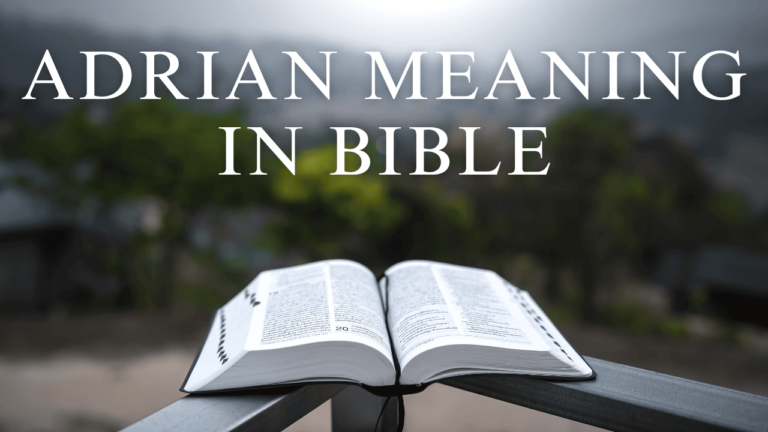Is Brittany a Biblical Name? Explore Its Hidden Meaning
Brittany can be considered a modern name, but it doesn’t have direct biblical roots. It originated from a region in France called “Bretagne” or Brittany, meaning “from Britain.” While it’s not a biblical name like Mary or Sarah, Brittany carries a sense of history and tradition due to its connection with ancient Celtic tribes.
Its hidden meaning often links to strength and independence, as Brittany was a land known for resisting invasions. Though not in the Bible, Brittany’s timeless quality makes it a meaningful choice for many, symbolizing resilience and heritage.
When selecting a name for a child, many parents seek names with deep meaning, history, or spiritual significance. Brittany is a popular and beautiful name, but you might wonder: Is Brittany a biblical name? What is its deeper meaning? This article will explore the origins, spiritual connotations, and whether the name Brittany has any biblical roots or connections.
Evelyn Grace
Theologian
Brittany may not appear in biblical texts, but its roots in ‘Britannia’ tie it to history and culture, invoking the essence of land, strength, and heritage.
The Origin and Meaning of the Name Brittany
Brittany is not a name directly found in the Bible. It has origins outside of biblical texts, but it still carries significant historical and cultural value. The name is derived from the region of Brittany in France, which dates back to when Britons fled to France following the Anglo-Saxon invasion of Britain.
- Origin: The name Brittany is of French origin, linked to the region of Brittany in northwestern France. It means “from Britain” or “of Britain.” The name emerged as a popular choice in English-speaking countries, particularly during the late 20th century.
- Meaning: The name Brittany, meaning “land of the Britons,” doesn’t have a direct biblical origin, but it represents a sense of heritage, belonging, and identity, which can still resonate with spiritual significance for many.
Even though Brittany is not a biblical name, it carries a cultural richness that has deep roots in the history of Europe and the Christian expansion in France.
Historical Context: Brittany and Christianity
The region of Brittany has a long association with Christianity, especially during the early medieval period. This connection with Christianity gives the name Brittany an indirect spiritual significance. Here’s a closer look:
- Early Christian Influence: Brittany became a key site for Christian missionaries. Several saints are associated with Brittany, such as Saint Samson and Saint Gildas, who helped spread Christianity in the area.
- Celtic Christianity: The Celtic Britons who migrated to Brittany brought their Celtic Christian traditions, further embedding Christian values and customs in the region. This makes the name Brittany culturally tied to a place with a strong Christian history.
Brittany as a Modern Christian Name
While Brittany is not a name from biblical times, it can still hold spiritual significance for Christian families today. Naming a child Brittany could reflect a connection to the Christian history of the region or an appreciation of the values passed down through the centuries. Some possible Christian interpretations of the name Brittany include:
Dr. Samuel Waters
Theologian
While Brittany is not of biblical origin, its meaning—’from Britain’—carries a symbolic resonance, suggesting a sense of belonging, identity, and origin, much like biblical names that reflect one’s place in the world.
- Heritage and Faith: For those who value tradition, the name Brittany can symbolize a connection to the Christian past, where faith was central to the culture and lifestyle of the people in that region.
- A Sense of Community: In the Bible, community is emphasized as a core value. The name Brittany, tied to a specific geographic region, can represent a sense of belonging and being part of a larger spiritual family, which is a biblical principle.
Spiritual Meaning of Brittany: Beyond the Bible
Even though Brittany is not a biblical name, names often carry spiritual meanings that transcend specific religious texts. The name Brittany can hold spiritual connotations depending on personal interpretation, including themes of identity, community, and cultural heritage.
- Identity and Heritage: Just as the people of the region of Brittany had a strong sense of cultural identity, the name Brittany can symbolize knowing who you are and where you come from. In Christianity, understanding one’s identity in Christ is a powerful theme, and the name Brittany can remind individuals of their spiritual roots.
- Community and Fellowship: The name’s association with a specific geographic area also emphasizes the importance of community. In the Bible, communities play a crucial role, from the early Christian church to the tribes of Israel. Brittany can symbolically represent the concept of fellowship and connection with others.
- Strength and Independence: Historically, Brittany was a region that maintained its independence and culture despite external pressures. Similarly, in a spiritual sense, the name Brittany could symbolize spiritual resilience and the strength to hold onto one’s faith in challenging times.
Is Brittany a Suitable Name for Christians?
Many Christian parents may wonder whether the name Brittany is appropriate for a child if it doesn’t appear in the Bible. The answer depends on the personal values and preferences of the family. While it’s not a biblical name, Brittany does carry historical Christian connections, and it symbolizes strength, community, and identity—all values cherished in Christianity.
Rebekah Winters
Theologian
Though not explicitly biblical, names like Brittany remind us that every name can carry a deeper spiritual significance, especially when seen through the lens of personal faith and cultural legacy.
Factors to Consider When Naming a Child Brittany:
- Cultural and Historical Significance: Brittany is a name with a rich cultural history tied to Christianity in Europe.
- Personal Meaning: For many, the name might represent family heritage, a connection to a particular culture, or simply be chosen for its aesthetic appeal.
- Biblical Values: Even though it’s not from the Bible, the name Brittany can still embody Christian values like resilience, community, and identity.
Brittany and Christian Virtues
While the Bible doesn’t mention Brittany, many Christian virtues can be associated with the name through its history and cultural background. These virtues may appeal to parents looking for a name that reflects their faith:
- Resilience: The historical region of Brittany maintained its cultural independence despite external challenges. Similarly, spiritual resilience is a key theme in the Bible, where believers are encouraged to stand firm in their faith.
- Community: As mentioned earlier, the region of Brittany is known for its strong sense of community. The Bible consistently speaks about the importance of fellowship, unity, and loving one’s neighbor.
- Humility and Service: Several saints from the region of Brittany lived lives of humility and service, which reflects the biblical call to serve others and live humbly (Philippians 2:3-4).
FAQs About the Name Brittany
Is Brittany a biblical name?
No, Brittany is not a name that appears in the Bible. However, it has historical connections to Christianity through the region of Brittany in France, which has a strong Christian history.
What does the name Brittany mean?
Brittany means “from Britain” or “land of the Britons.” It refers to the region of Brittany in France, which was named after Britons who settled there.
Is Brittany a good Christian name?
While it’s not a biblical name, Brittany can be a good Christian name for those who value the historical and cultural connections to Christianity in the region of Brittany. It can also represent values like community, resilience, and heritage.
What are some Christian values associated with the name Brittany?
Some Christian values associated with Brittany include resilience, community, humility, and service to others. These values are deeply rooted in biblical teachings and can make Brittany a meaningful name for Christian families.
Are there any saints named Brittany?
There are no saints named Brittany specifically, but several saints are associated with the region of Brittany in France, such as Saint Samson and Saint Gildas, who were early Christian missionaries.
Conclusion
While Brittany is not a biblical name, it carries a rich history and connection to Christianity through the region of Brittany in France. The name represents values of community, strength, and identity, which can resonate deeply with Christian families looking for a name with meaning. Even though it doesn’t appear in the Bible, Brittany can be a suitable and meaningful name for a child, especially considering its historical and spiritual significance.
In a world where names carry cultural and spiritual weight, Brittany offers a blend of history, strength, and Christian virtue, making it a unique and powerful choice for those seeking a name with deeper meaning. Whether it symbolizes resilience, heritage, or community, the name Brittany stands strong, much like the region from which it originates.







